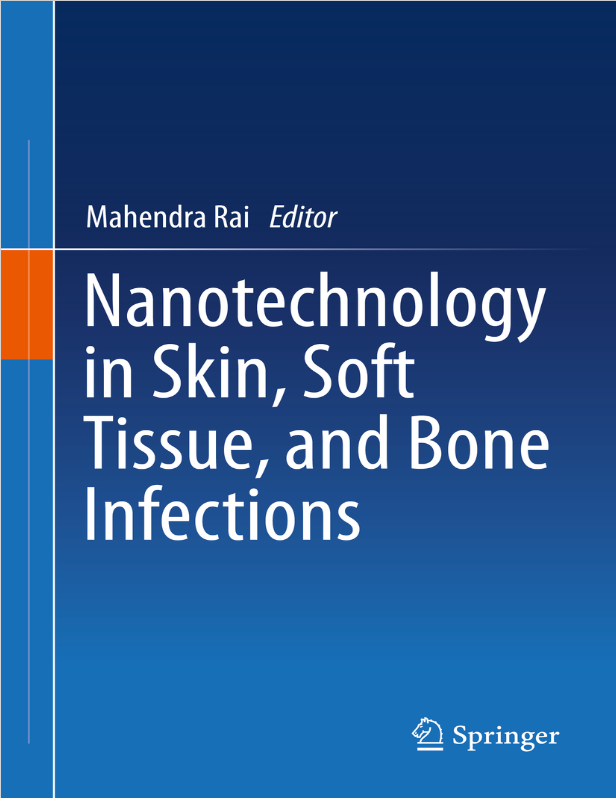Newly released
This book is new and will be uploaded as soon as it becomes available to us and if we secure the necessary publishing rights.

Nanotechnology in Skin, Soft Tissue, and Bone Infections Book PDF
(0)
Author:
Mahendra RaiNumber Of Reads:
59
Language:
English
Category:
TechnologySection:
Pages:
419
Quality:
excellent
Views:
613
Quate
Review
Save
Share
Book Description
The main goal of the present book is to deal with the role of nanobiotechnology in skin, soft tissue and bone infections since it is difficult to treat the infections due to the development of resistance in them against existing antibiotics. The present interdisciplinary book is very useful for a diverse group of readers including nanotechnologists, medical microbiologists, dermatologists, osteologists, biotechnologists, bioengineers. Nanotechnology in Skin, Soft-Tissue, and Bone Infections is divided into four sections: Section I- includes role of nanotechnology in skin infections such as atopic dermatitis, and nanomaterials for combating infections caused by bacteria and fungi. Section II- incorporates how nanotechnology can be used for soft-tissue infections such as diabetic foot ulcer and other wound infections; Section III- discusses about the nanomaterials in artificial scaffolds bone engineering and bone infections caused by bacteria and fungi; and also about the toxicity issues generated by the nanomaterials in general and nanoparticles in particular.
Mahendra Rai
Dr. Mahendra Rai is a Senior Professor and UGC-Basic Science Research Faculty at the Department of Biotechnology, Sant Gadge Baba Amravati University, Amravati, Maharashtra, India.
Professor Rai has published more than 400 research papers in Indian and foreign peer reviewedjournals, 50 books in association with some reputed publishers such as Springer, Elsevier, CRC, Taylor and Francis and Scientific Publisher, and more than 102 popular articles. Professor Rai’s research has provided seven patents. He is a member of several scientific societies. His area of expertise includes microbial biotechnology and nanobiotechnology. Currently, the main research interest of his group is biogenic synthesis of metal nanoparticles particularly using fungi and their applications as nanoantimicrobials against multidrug resistance microbes. He believes that silver nanoparticles are the new generation of antimicrobials because of their potential against human pathogenic microbes and also for possibility of solving the problem of drug resistance by using a combination of the silver nanoparticles with different antibiotics. His research is highly interdisciplinary and combines microbial biotechnology with nanotechnology. He aims to focus on understanding the mechanism of biological synthesis of metal nanoparticles by microbes and also the toxicity issues. Recently, he has been interested in using of nanoparticles for the management of plant pathogens.
He has received several prestigious awards, including the father T.A. Mathias award (1989) from the All India Association for Christian Higher Education, and the Medini Award for book on Herbal Medicines by the Government of India. He also visited Brazil under TWAS-UNESCO Associateship (2002, Italy), as a Visiting Scientist at the Department of Bioenergetics, University of Geneva, Switzerland (2004), under Hungarian Scholarship to visit the Department of Plant Protection, Debrecen University, Hungary (2006, 2008, 2015), as a Visiting Professor, Department of Microbiology, Nicolaus Copernicus University, Torun Poland (2012, 2014, 2015); also as a Visiting Scientist, Biological Chemistry Laboratory, State University of Campinas under Indo-Brazil programme (2009-2012), and in 2013 under FAPESP programme. In 2015 (October- November), he was a visiting scientist at Nanotechnology Center, VSB Technological University of Ostrava.
Dr. Rai serves as a referee for 20 international journals and is a member of the editorial board of ten national and international journals. He has approximately three decades of teaching and research experience.
Dr. Rai has numerous international collaborations, including Argentina, Hungary, Switzerland, Italy, Germany, Brazil and USA in microbial biotechnology and nanobiotechnology.
Book Currently Unavailable
This book is currently unavailable for publication. We obtained it under a Creative Commons license, but the author or publisher has not granted permission to publish it.
Rate Now
5 Stars
4 Stars
3 Stars
2 Stars
1 Stars
Nanotechnology in Skin, Soft Tissue, and Bone Infections Quotes
Top Rated
Latest
Quate
Be the first to leave a quote and earn 10 points
instead of 3
Comments
Be the first to leave a comment and earn 5 points
instead of 3